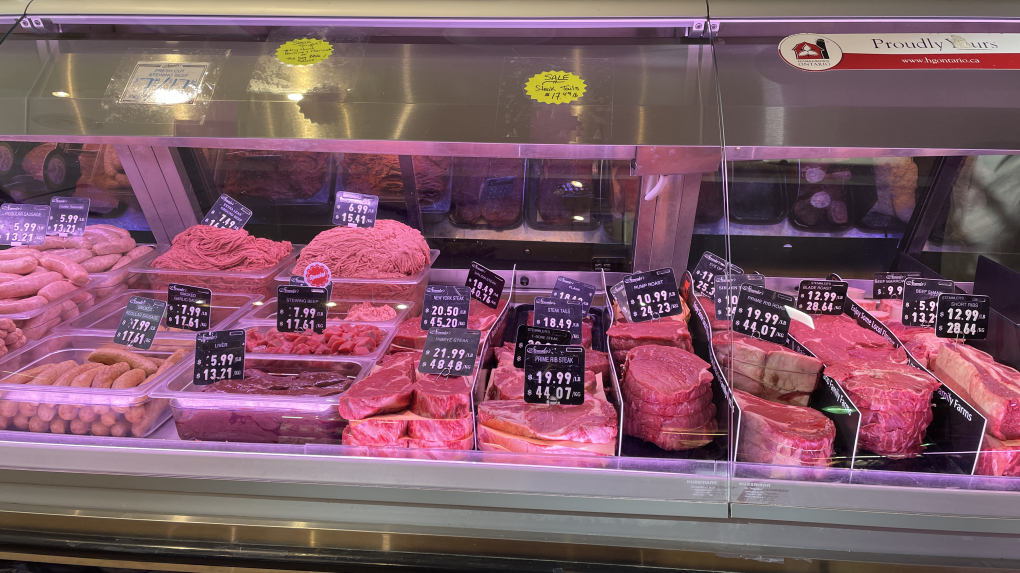Ontario farmers and consumers feeling burned by skyrocketing beef prices
Shoppers might experience some sticker shock when they see the price of beef at their local grocery store.
"The prices are definitely a little higher than what they've been in the past," admitted Jack Chaffe, a southwestern Ontario feedlot operator.
According to Statistics Canada, the average cost for a kilogram of ground beef is currently $13. Four years ago, it was selling for $10 a kilogram.
Sirloin steak, meanwhile, is now roughly $22 a kilogram – up from $6 in 2016.
"The pricing was just unbelievable," said shopper Wayne MacLean. "I mean, you get three little pieces of steak and you're paying, you know, $55 to $60.”
And it’s not just shoppers feeling burned.
Ontario farmers and butchers are facing their own uphill battle to stay in the game.
"Likely the biggest thing is the investment in feeder cattle and the feed part,” Chaffe explained. “A lot of capital tied up in our operation.".
Farmers say the cost of feed, fuel and farming equipment have soared, leaving razor thin margins.
"At this point, we're basically breaking even on most of our cattle,” added Chaffe. “If not, we're maybe losing a little bit of money.”
Stemmler's Meats, a butcher shop based out of Heidelberg, Ont., has noticed a change in the spending habits of shoppers.
"We see, at times, that people may purchase a less expensive kind of protein, or they may shop for price-based specials, so that's just changing their buying patterns," explained Stemmler's Meats President Terry Stemmler.
 Beef on display at Stemmler's Meats in Heidelberg, Ont. (Hannah Schmidt/CTV News)
Beef on display at Stemmler's Meats in Heidelberg, Ont. (Hannah Schmidt/CTV News)
Experts say a mix of inflation and global demand is partly to blame for the recent price surge.
"We've seen an incredible demand for Canadian beef," said Jamie Kerr, a market analyst with Canfax. "The consumer, they're really looking to put beef on the center of their plates."
Kerr also noted that climate change has been a huge factor.
"We have seen a decline in the Canadian cattle herd since 2020. It is drought related,” he said. “There is a smaller supply of beef and, in that instance, we do rely on imports."
With beef being priced the way it is, consumers could turn to other alternatives during the holiday season.
"All food [pricing] is discouraging,” said shopper Robert Balcerzak. “You know what's going to be taken off the list? Beef. It's at its highest price. So everybody's moving down a few notches."
CTVNews.ca Top Stories

Here’s the latest on this weekend's winter storms in Canada
From snow, to high winds, to extreme cold, much of Canada is under a severe weather alert this weekend. Here's what to expect in your region.
Here’s why you should monitor your blood pressure, keep it in check
An Ottawa pharmacist says blood pressure is a good indicator of overall health, noting the importance of keeping it at healthy rates.
WATCH Woman critically injured in explosive Ottawa crash caught on camera
Dashcam footage sent to CTV News shows a vehicle travelling at a high rate of speed in the wrong direction before striking and damaging a hydro pole.
Big Dreams for ‘The Littlest Hobo’: Fans push for star on Canada’s Walk of Fame
When Terry Bush co-wrote and sang Maybe Tomorrow, the theme song for The Littlest Hobo, he thought it was just another gig—a catchy tune for a TV show about a wandering German Shepherd. Forty-five years later, that 'little tune' still tugs at heartstrings, pops up on playlists, and has even been known to be played at closing time in English pubs.
Air Canada passengers living with extra baggage fees
Some Air Canada passengers at Montreal’s Trudeau Airport were annoyed that they will now have to pay additional fees for their carry-on luggage.
Mark Carney reaches out to dozens of Liberal MPs ahead of potential leadership campaign
Mark Carney, the former Bank of Canada and Bank of England governor, is actively considering running in a potential Liberal party leadership race should Justin Trudeau resign, sources tell CTV News.
This Canadian couple has been to 195 countries. Here's what they learned on their eight-year journey
Masha and Robert Glanville, a Canadian couple, sold everything they owned to travel the world full-time. With over 195 countries visited, they focus on mindful, eco-friendly travel and giving back. Here’s what they had to say about their global journey.
Britain wants to get close to Trump. Will Elon Musk stand in the way?
It was not the start to 2025 that Keir Starmer wanted or expected: in the early hours of New Year’s Day, Elon Musk lobbed a series of angry posts and allegations towards the British prime minister, engulfing his government in a very public fight.
Peel police investigate possible connections between gunshot injury, luxury vehicle carjacking
Police are investigating possible connections between a gunshot injury and an attempted carjacking in Mississauga.































